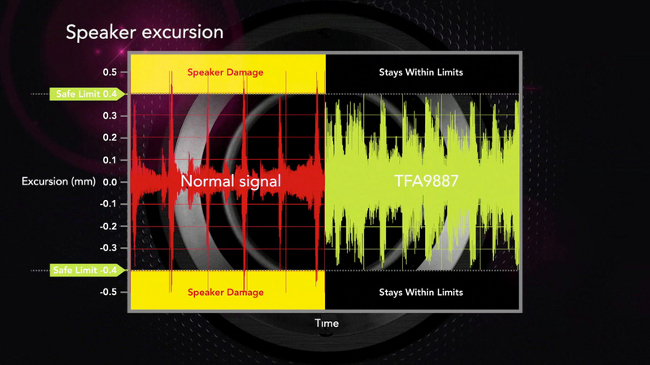NXP Semiconductors’ TFA9887 IC that comes with embedded algorithms that monitor speaker performance and prevent damage could help to produce a new generation of mobile devices with better, louder and more reliable sound quality, boosting the power of micro-speakers by more than five times.
Speakers in mobile devices need to be small and reliable, and there’s also a great demand for good sound quality. But the smaller micro-speakers have become, the more limited the output and poorer the sound quality.
Because these tiny speakers can be destroyed if an amplifier delivers too much power, designers have compromised by cutting out bass frequencies and limiting output.
“Digital natives have come of age taking poor mobile sound quality for granted. As speakers have become smaller, the quiet, tinny sound we’ve come to associate with mobile devices has got even worse,” said Shawn Scarlett, NXP’s director of marketing, mobile audio product line.
“Our new audio system transforms the listening experience, enabling louder, richer sound quality from virtually any mobile device. The improvement is so striking that consumers, handset makers and operators will immediately hear the difference,” he said.
How it works
The TFA9887 IC incorporates safety features that prevent damage to the speaker at all times. Adaptive excursion control ensures that the excursion of the speaker membrane never exceeds its rated limit while real-time temperature protection prevents thermal damage.

With the speaker protected, the system can deliver more power for louder sound, deeper bass and better quality without the risk of speaker damage.
The chip is packed with other audio-enhancing technology, such as an algorithm that prevents clipping even if the power supply dips and an optional bandwidth extension to increase the low frequency response well below speaker resonance.
The TFA9887 is also environmentally aware and can adapt to any changes in the speaker, including ageing, damage to the enclosure, and blocked speaker ports, helping to optimise performance.
This chip could be used in mobile phones, tablet computers, portable audio players or portable gaming devices, eliminating the poor sound quality we’ve come to expect from these products.